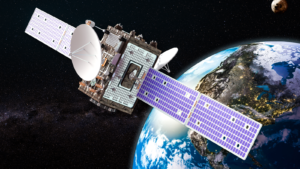The space economy includes applications like satellites, launchers, and broadcast services. It also directly impacts applications where space technology supports other industries, such as GPS for car navigation. As of 2023, the global space economy was valued at $630 billion. The market is expected to grow to $1.8 trillion by 2035.
With the industry’s potential just beginning to unfold, here are three smart space stocks that investors should consider right now. However, these companies are not just part of an economic sector set for liftoff. Rather, they also trade strategically positioned to capitalize on the expanding horizons of human activity beyond Earth.
Northrop Grumman (NOC)

Northrop Grumman (NYSE:NOC) is a leading aerospace and defense technology company. The company has established a significant presence in the realm of space exploration and satellite technology.
Northrop Grumman’s space operations encompass a broad spectrum of activities, including the development and manufacture of satellites, space sensors, and integrated systems for global and national security. One of the company’s standout contributions is its involvement in the development of the James Webb Space Telescope, which promises to extend our understanding of the universe.
The company’s commitment to shareholder returns is evident in its dividend history and policies. The company has raised its dividend for 20 consecutive years.
Looking forward, Northrop Grumman’s growth prospects appear robust, supported by its involvement in high-priority defense programs. These colossal projects include the B-21 Raider bomber and its substantial role in the F-35 program. The focus on space systems and advanced defense technologies aligns with current and future defense trends, potentially driving continued revenue and earnings growth.
Rocket Lab (RKLB)

Rocket Lab (NASDAQ:RKLB) has established itself as a significant player in the aerospace sector. The company provides comprehensive space solutions that include satellite manufacturing and mission management.
Rocket Lab’s journey through 2023 and into 2024 has included a strategic blend of expansion and technological advancements. The company reported a robust increase in revenues by 69% year-over-year (YOY) in Q1 2024. This signals strong demand for its satellite launch and space systems services. The revenue spike is largely thanks to its Space Systems division, which generated $93 million in the first quarter alone.
Rocket Lab’s competitive edge lies in its ability to provide frequent and reliable launches with its Electron rocket, tailored for small payloads. The company’s innovation goes beyond launches alone. For example, the upcoming Neutron rocket will enhance Rocket Lab’s payload capacity, potentially transforming it into a key player for more extensive missions, including crewed spaceflights.
Planet Labs (PL)

Planet Labs (NYSE:PL) has been transforming the satellite imagery sector through its constellation of Earth-imaging satellites. The company has carved out a niche in the rapidly growing satellite imagery market propelled by advancements in technology and increasing commercial demand.
In Q1 2025, the company recorded $60.4 million in revenue, marking a 15% YOY growth primarily driven by the government sector. The non-GAAP gross margin stood at 55%, with an adjusted EBITDA loss of $8.4 million, reflecting quarter-over-quarter improvements. Planet Labs expects Q2 revenues to be between $59 million and $63 million. It will do so with a continued emphasis on leveraging government sector momentum and managing commercial sector challenges.
Looking ahead, Planet Labs potential lies in its ability to harness and monetize its extensive data streams. With the upcoming launch of more advanced satellites, the could enhance its data offerings and expand its customer base.
On the date of publication, Mohammed Saqib did not hold (either directly or indirectly) any positions in the securities mentioned in this article. The opinions expressed in this article are those of the writer, subject to the InvestorPlace.com Publishing Guidelines.
On the date of publication, the responsible editor did not have (either directly or indirectly) any positions in the securities mentioned in this article.
Mohammed Saqib is a research analyst with experience in equity research and financial modeling. He has extensively covered stocks listed in the tech sector using fundamental analysis as the cornerstone of his approach. Currently pursuing a master’s degree in finance, Saqib is dedicated to obtaining the CFA charter to augment his expertise in the field further.
